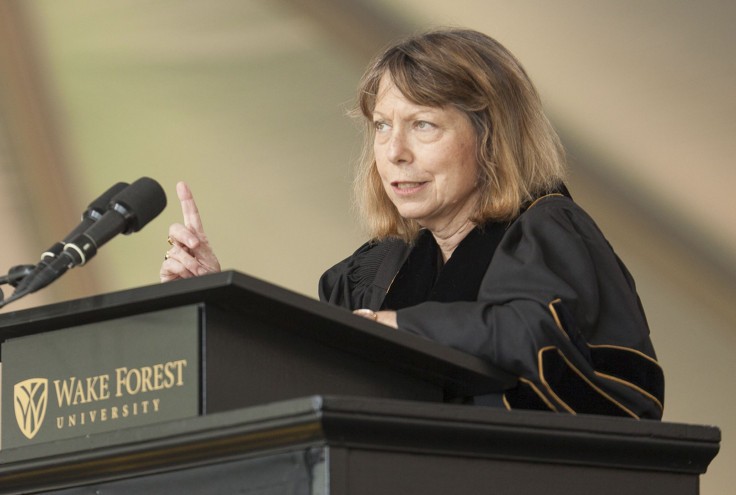Jill Abramson Talks ‘Backlash,’ Women’s Progress And Yes, New York Times Firing

Ousted New York Times Executive Editor Jill Abramson seems to be popping up everywhere lately, always ready to candidly discuss her high-profile firing at the Times and tenuous advances made by women in business and media.
Her latest appearance, on MSNBC with host Irin Carmon on Thursday, focused on how much progress women have made since Susan Faludi’s polarizing book “Backlash” was published over 20 years ago.
“When I first read it in 1991, I was really angry,” Abramson said. “And now, re-reading it ... as a 60-year-old, I was appalled that I had forgotten so much about it. It made me sad this time rather than angry.”
Abramson said she sees one of the biggest messages of the book as reminding women that periods of progress for feminism are almost always followed by a backlash. “Obviously I was reading it the summer after I’d been fired by the Times,” Abramson pointed out, but she went on to cite examples of too-slow progress in gender equality.
“There are no female anchors, when I look at the major magazines and the major newspapers, the cover is a little threadbare right now. “
“It made me a little sad and a bit worried," Abramson said. "If Susan was writing the book now, would she say…that after a period of breakthrough is there backlash [now]?”
Abramson is also discouraged by the continued role of the media in perpetuating unhealthy messages. “If there is a villain in [‘Backlash’], the villain is the media,” she said. “The villain is journalism and the echo chamber for these negative messages that feminism is what is making you miserable and there are too many single women.”
Carmon pointed out that some people viewed Abramson’s firing as a kind of reckoning that Faludi’s book warns about, and asked Abramson if she saw anything similarly symbolic in the loss of her job.
“It isn’t my desire to become some symbol of backlash or leaning too far in or whatever,” Abramson said. “There were issues and problems involving me and the Times, and I just don’t think that there are easy, pithy ways to describe what happened to me.”
Last week, Abramson sat down with Re/code’s Kara Swisher to talk about similar topics, ranging from her firing to the fate of journalism to her plans for the future.
When asked why she was fired from her position as executive editor at the Times, she replied, “I’m still trying to figure that out. I’m not altogether sure. I know what’s been said publicly, and must accept that on its face, I suppose.” When pressed by Swisher to address the language used by the media to describe her managerial style in the wake of her firing -- “strident” and “pushy” -- she said, “Qualities that are seen as exhibiting leadership and strength in a man are criticized through a different prism in a woman.” She also noted she was wearing a necklace of the hashtag her daughter created to discuss the firing on Twitter, #pushy.
As for her plans for the future, Abramson told Swisher that she would be teaching a course to 12 students she hand-picked at Harvard for her fall course on journalism writing. “Without being immodest,” she said, “I’m a hell of a reporter and journalist and I’m going back to investigating and telling stories… I’d like to work at the highest-quality kind of magazine.”
© Copyright IBTimes 2024. All rights reserved.






















